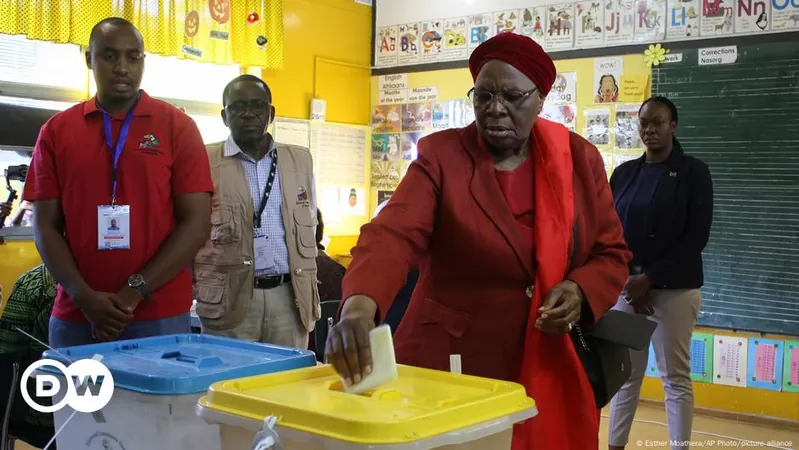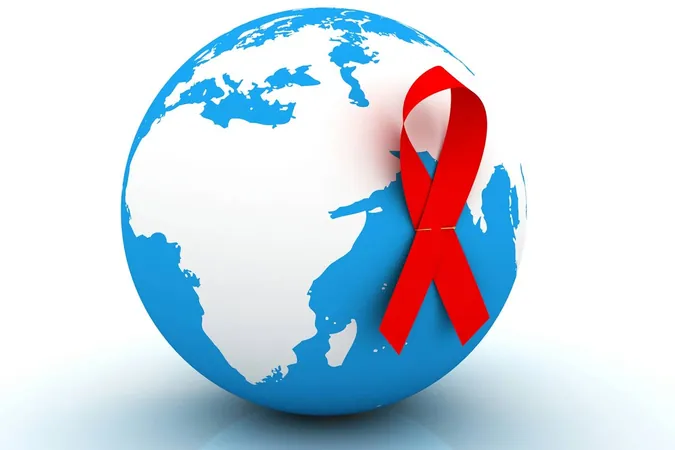
Historic Victory: Namibia's Ndaitwah Becomes First Woman President!
2024-12-04
Author: Jacob
Historic Victory: Namibia's Ndaitwah Becomes First Woman President!
Netumbo Nandi-Ndaitwah of the SWAPO party has made history by winning Namibia's presidential elections outright with an impressive 57% of the vote, as reported by the electoral commission on Tuesday. This decisive victory means that no second-round runoff will be required, marking a significant moment in the nation’s political landscape.
After her victory was announced, Nandi-Ndaitwah declared, 'The Namibian nation has voted for peace and stability.' This sentiment resonates deeply especially considering Namibia's quest for national unity and progress as it navigates the challenges of governance.
Her nearest rival, Panduleni Itula of the Independent Patriots for Change (IPC), garnered 26% of the votes but has stated intentions to contest what he describes as 'deeply flawed' results. This ongoing dispute could lead to further scrutiny of the electoral process, as the IPC has claimed numerous irregularities.
Voter turnout was high, with 77% participation from nearly 1.5 million registered voters, reflecting a robust commitment to the democratic process in Namibia.
Nandi-Ndaitwah, at 72 years old, previously served as the vice president and has held various leadership roles, including that of foreign minister. She represents a continuity of the SWAPO party's dominant presence in Namibian politics since independence from South Africa in 1990. However, the party has faced increasing challenges in recent years due to rising unemployment rates, significant inequality, and allegations of corruption within the government. As a result, this election was notably more competitive compared to previous ones.
The results also revealed that SWAPO secured 51 out of 96 parliamentary seats, while the IPC won 20 seats, positioning itself as the official opposition. This shift in the political landscape underscores growing discontent among voters, especially in light of issues facing the country.
Despite the significance of the victory, the elections were marred by reports of technical issues, including delays caused by ballot paper shortages. These complications initiated considerable frustration among voters and allegations from the IPC of a deliberate strategy to undermine the electoral process.
The world is watching closely as Namibia takes these pivotal steps toward a new era of leadership. The implications of Nandi-Ndaitwah's presidency extend beyond national borders, especially as Namibia engages with Germany on the Hyphen Project, which aims to export substantial quantities of hydrogen from 2028, alongside ongoing discussions regarding historical reconciliation efforts stemming from colonial times.
As Namibia embarks on this new chapter under its first female president, the promise of stability and progress hangs in the balance, leaving many curious about how her leadership will shape the future of the nation.









 Brasil (PT)
Brasil (PT)
 Canada (EN)
Canada (EN)
 Chile (ES)
Chile (ES)
 España (ES)
España (ES)
 France (FR)
France (FR)
 Hong Kong (EN)
Hong Kong (EN)
 Italia (IT)
Italia (IT)
 日本 (JA)
日本 (JA)
 Magyarország (HU)
Magyarország (HU)
 Norge (NO)
Norge (NO)
 Polska (PL)
Polska (PL)
 Schweiz (DE)
Schweiz (DE)
 Singapore (EN)
Singapore (EN)
 Sverige (SV)
Sverige (SV)
 Suomi (FI)
Suomi (FI)
 Türkiye (TR)
Türkiye (TR)